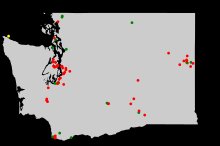Environmental Issues in Washington (state)
By Derek Sandison, Director, Washington State Department of Agriculture
Since joining the Washington State Department of Agriculture in 2015, I’ve been inspired by the dedication of the staff here at WSDA and the work they do to support agriculture and consumers. We work in partnership with a broad list of organizations that includes the U.S. Department of Agriculture, Washington State University, the Washington State Conservation Commission, 23 commodity commissions and other agricultural support organizations. In addition, we partner regularly with several state and federal agencies as well as local government agencies, municipalities and counties.
All of them are needed to help us fulfill what I see as our three primary roles: regulator, facilitator and advocate.
Regulation
As a regulatory agency, we focus on education before enforcement, while striving to provide a level playing field for the agriculture and food industry. In the coming year, one of our major efforts will be to assist the ag industry as it adapts to requirements of the Food Safety Modernization Act, a major update to rules of the Food and Drug Administration (FDA).
WSDA adopted the FSMA rules under state code. Now we are reaching out to licensed food processors and growers to educate them on the requirements. We have also worked with the FDA to seek clarity on the rules and created a new Produce Safety Program to provide guidance about these new requirements, as well as fair and effective enforcement.
Another federal agency, the Environmental Protection Agency (EPA), recently updated protection standards for workers that apply pesticides. Beginning in January, WSDA has been required to enforce these new standards and has provided extensive outreach to the industry.
Facilitation
Some issues affecting agriculture don’t have an easy solution. One role WSDA often plays is as facilitator, bringing different groups together to discuss difficult issues and build bridges as we seek consensus on a path forward. One such issue is the effect of dairy manure on water quality.
The state’s Dairy Nutrient Management Act requires dairies to develop plans to manage the manure produced by their cows. WSDA’s Dairy Nutrient Management Program enforces this act and works with the state Department of Ecology to enforce parts of the state’s Water Pollution Control Act related to dairies.
To ensure our program is as effective as possible, in late 2016 WSDA created a Dairy Nutrient Advisory Committee. Meeting regularly, this group represents a diversity of interests and reviews the work of our program. The goal is for the group to identify areas that could use improvement, and make recommendations to that end.
Advocate
Advocating for Washington agriculture can mean making sure decision makers at other agencies are aware of the impact their regulations have on farmers and ranchers, but it can also mean promoting agriculture, both at home and abroad. Washington agriculture exports 30 percent of what’s produced in our state. Trade missions help sustain and build demand for these products.
Japan, Canada, China, the Philippines and South Korea are Washington’s top export markets for agricultural products. Maintaining relationships with key government officials, import buyers and others involved in moving our food products to these foreign markets is often the focus of the trade missions we join.
This year, we are preparing for more potential trade missions to key markets for our products. A trade mission with Mexico, Washington’s seventh largest agricultural export market, is one possibility.
Coming trends and opportunities
Agriculture, in Washington and elsewhere, faces a number of ongoing challenges including environmental concerns, a growing population to feed and the increasing age of the average farmer.
But there are opportunities, too. Technology is increasing precision agriculture, improving efficiency and bringing down costs. And while farmers are aging, demographics are changing, too. More women are entering agriculture, as are military veterans, people new to farming entirely and others who began working at farms as laborers and have become farm operators themselves.
To address these issues, or take advantage of the opportunities, it will require that we rely more than ever on our partnerships and the strength of the agriculture community.










